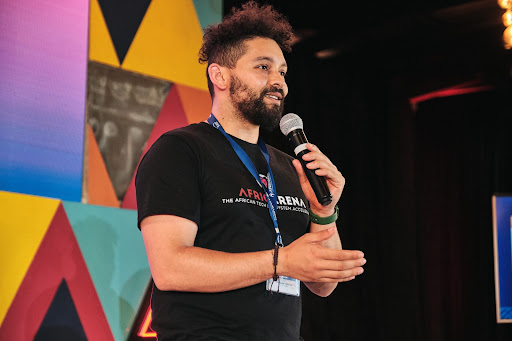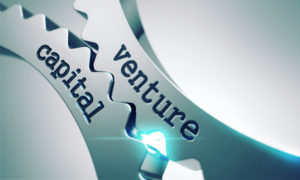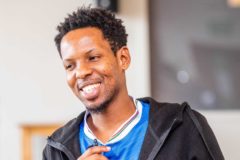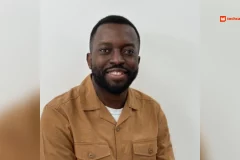Nathaniel Witbooi is programme manager and ecosystem lead at AfricArena. He has evaluated over 400 startups and accelerated 80 startups on the African Continent from 35+ countries in 2022.
Explain your job to a five-year-old.
My job is to find people who would like to create games for people to play. I then host a party to connect them to people who can give them pocket money to try and build their dream game and teach others how to play and buy the game they create. I connect new and old friends to work together to make the world a better place because it’s not fun playing a game by yourself.
What did you want to be as a child, and are you living the dream?
I wanted to be an/singer/songwriter. I am most definitely living the dream, with over 100,000 people streaming my music on Apple Music, Spotify and other streaming platforms globally! I still make time to live out the promise I made to little Nate. If I am being honest with myself, sometimes I wish I had more time to be creative, but impacting and stimulating the African economy is just as rewarding.
What’s the most exciting thing about South Africa’s tech ecosystem?
There are numerous exciting variables, but the most recent development evaluates the total number of 100 exits in the African continent between 2020 and 2022. The data provided by Max Cuvellier from the Big Deal, shows that South Africa has seen 33 startups exit over the past two years. It seems to be the highest amount of publicly disclosed exits on the African continent.
What are the most exciting and exhausting aspects of building communities and ecosystems for Africa’s tech?
The most exciting thing is meeting different communities and people across the African continent. It tends to break the veil of what you think the world is like versus what it is. I would call the experience sobering in nature.
You get to debunk all the sensational media stories about regions, and learn about people, communities and the commonalities of societies. It has changed the way I view the world, and given me a sense of respect for people on the ground hustling and the challenges each region faces while scaling and attempting to do business in Africa.
The hardest part of the job is the time you miss out with your family. Travelling is definitely a bonus, but it forces you to reflect on the micro-influential communities that impact you. To put it in layman’s terms, I tend to miss my family a lot and wish I could spend more time with them.
As someone with wide experience in programme management, what are the most programme-related critical changes you’ve seen over the past decade?
Programme management has become more mobile.
When you think about programmes in the past, all you needed was a framework, a curriculum and an audience. These days you find it more complicated as you need to ensure that whatever you create or curate has a level of impact and criteria to evaluate the outcomes of your program.
You have a complex group of people and stakeholders coming closer together, bringing various innovative industries into a hybrid merging ecosystem. You can simply say that there is no longer a clear cookie cutter that speaks to a simple vertical without touching on multiple transversal points. The world is accelerating at an exponential rate and the key is to remain agile, keep up to date with relevant data and build a strong network to stay informed on the ever-changing innovative landscape. There’s nothing worse than creating a panel, curriculum or mentorship session that is outdated and serves no purpose towards creating impact or change.
Programme management has evolved from curating good—focused—content to curating relevant and impact.
As you run a pan-African programme with a sector-agnostic focus, how do you keep track of all the trends across the continent?
Taking a horizontal approach to a market is no easy task. A human being only has so much RAM to retain a finite amount of data over time. When dealing with a sector-agnostic programme, the trick of the trade is to become a general specialist, dissecting the overlapping commonalities of the participants, which in the case of AfricArena is investment readiness, pitching development, social capital acceleration, media connections, customer acquisition and scaling.
The other crucial part is tapping into the ecosystem and finding strong partners with expertise to stimulate and refine startups to the point of investment. An example would be areas like mentors, advisors or investors.
The success of a sector-agnostic program relies heavily on Specialised ESOs (Ecosystem Support Organisations) and surrounding your organisation with an experienced community that has a shared interest in the future of the African prospect.
You have to be willing to learn, listen and have an open mind with an ear on the ground. The nature of the industry is constantly evolving, bringing new sectors on the rise. As the African tech ecosystem draws more competition, the age of sector agnosticism will end. You will start to see a trend of more specialised programs emerge, but we still have a couple of years before that happens.
If you are a startup on the African continent in the Seed to Series B stage, looking for a platform or an opportunity to connect to investors or would simply just like to ask for advice, you are more than welcome to reach out to me at nathaniel@africarena.co.za, I’m here to support the fast emerging African tech ecosystem and look forward to engaging with you.
What’s something you love doing that you’re terrible at? And something you really do not like doing that you’re great at?
I’m terrible at drawing. I do enjoy doodling and trying to paint. Unfortunately, it’s a skill I can’t master in this lifetime. My sister’s got that talent.
I am however really good at sales, I mean I like to call it partnerships, for lack of a better word. But even though people say I’m gifted at it, I still don’t like the idea of sales targets. I believe it’s due to my strong conviction to build a valuable community and wanting to change the world by creating fair access to resources. That’s why programme management is the best of both worlds for me.
If you could be any Marvel/DC superhero, who would you be and why?
Hands down, The Flash. I love Barry Allen because just like the Tech/VC Industry I’m in, I appreciate that he does his research. He’s very data-savvy, smart, empathetic, loves to problem solve, quick on his feet, pivots fast, can wear many hats, and gets tasks done quickly. Hands down the perfect fit for me.






















